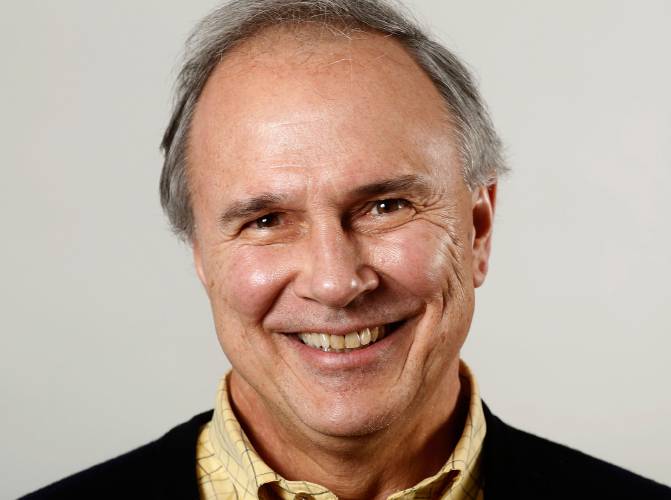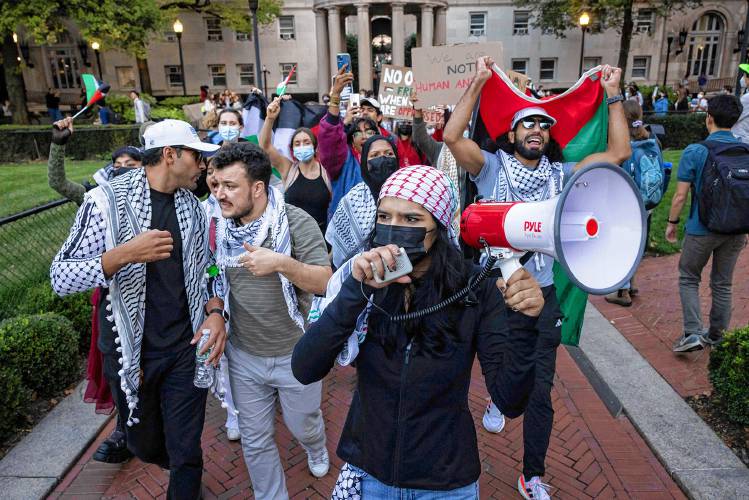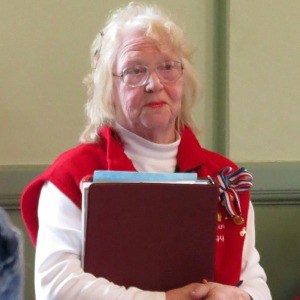Kenyon: No respite from conflict in Upper Valley
| Published: 10-22-2023 1:16 AM |
Mohsen Mahdawi was looking forward to a break from city life and spending a long holiday weekend at the hilltop cabin he built a few years ago in West Fairlee.
With foliage season nearing its peak, Mahdawi expected to do some leaf peeping. He envisioned sitting on the remote cabin’s deck at sunset, taking in the day’s last light before the valley below slipped into darkness.
Then there was the research paper he needed to write for his philosophy class at Columbia University, where he’s in his final year of undergraduate work. The cabin’s solitude would do him good.
But when Mahdawi checked his cellphone before leaving New York on Oct. 7, he found text messages from family and friends.
Hamas, the Palestinian militant group based in the Gaza Strip, and Israel were at war.
Mahdawi’s plans abruptly changed.
As news spread of Hamas’ barbaric attack on Israel, Palestinian students and their supporters at Columbia found themselves being “threatened and doxed,” said Mahdawi, co-president of the Ivy League school’s Palestinian student union.
“I needed to stay here with the people in my community,” he said in a phone interview after I reached out to him last week. “I had to find ways to give them strength.”
Article continues after...
Yesterday's Most Read Articles
Mahdawi, 33, brings an insider’s view to the decades-old Israel-Palestine conflict.
He grew up in a Palestinian refugee camp in the West Bank, which has been under Israeli military rule for as long as four generations of his family have lived there.
In December 2020, I wrote a two-part series about Mahdawi’s 5,500-mile journey from the West Bank to the Upper Valley.
As a boy, he saw his best friend shot dead by an Israeli soldier. He was still a teenager when his “favorite” uncle became another casualty of the never-ending conflict.
At 15, Mahdawi joined a protest against the Israeli occupation that turned volatile. Israeli soldiers opened fire. He started to run. When he slowed down, he detected a squishing sound. “My shoe was filling with blood,” he said.
He’d been shot in the leg. “The scar is still there,” he said.
When I asked Mahdawi about the Hamas attack on Oct. 7 that killed more than 1,400 Israelis, most of them civilians, and saw 200 people taken hostage, he paused for a moment.
“Hamas is a product of the Israeli occupation,” he said. Hamas, which has governed Gaza since 2007, has been designated as a terrorist organization by the U.S. and European Union.
Mahdawi shares the view of many Palestinians that Gaza is a longtime “open-air prison” of Israel’s doing.
“Now it’s a prison that’s not allowed to have food, water, medicine and electricity,” he said. (There were reports that limited amounts of humanitarian aid began crossing into Gaza on Saturday.)
Retaliatory Israeli air strikes have killed more than 3,500 people in Gaza, which has a population of 2 million.
“All life is equal for me — Palestinians and Israelis alike,” Mahdawi said. “Every life is a precious one, and unfortunately the numbers are increasing.”
The fighting has spilled into the West Bank, claiming more than 80 lives as of Saturday. Mahdawi told me his father, siblings and other relatives are afraid to leave their homes. “Every night, there is shooting by Israeli soldiers and settlers,” he said. “No one is safe.”
Shortly after Hamas’ attack, Mahdawi joined leaders of other Palestinian solidarity groups at Columbia in writing a statement regarding “recent events” in Palestine and Israel.
“We remind Columbia students that the Palestinian struggle for freedom is rooted in international law, under which occupied peoples have the right to resist the occupation of their land,” they wrote. “If every political avenue available to Palestinians is blocked, we should not be surprised when resistance and violence break out.”
On Oct. 12, Mahdawi was among hundreds of pro-Palestinian demonstrators who gathered on Columbia’s South Lawn. Supporters were called terrorists and had water thrown at them, he said.
Fearing retaliation, many Palestinian supporters wore face masks to hide their identities.
Not Mahdawi.
“I won’t be intimidated,” he said. “I’ve watched my best friend die. My uncle was killed. I was shot in the leg. Am I going to be scared by having water thrown at me?”
When I met Mahdawi three years ago, he talked about how moving to the Upper Valley had changed him. “When I was growing up, I cursed the Israelis. I cursed the Americans,” he said. “Now I see there are American Jews who understand.”
Rabbi Dov Taylor, of Woodstock, was at the top of the list. A friend had introduced Taylor to Mahdawi, who shared his story of coming to the U.S. alone, working at a Hanover cafe to improve his English and being rejected for admission at Dartmouth.
He later enrolled at Lehigh University in Pennsylvania before transferring to Columbia, where he’s earned a scholarship that covers tuition. Law school is next.
“Mohsen is a most extraordinary young man, especially considering what he’s been through,” Taylor said when I called him last week. “I don’t know anyone else quite like him.
“He has a very strong character. He doesn’t believe in vengeance. He believes in peace.”
With the war entering its third week and an Israeli ground invasion only a matter of time, Mahdawi doesn’t expect to retreat to his cabin anytime soon. (Before starting at Columbia, he used much of his savings and borrowed the rest to buy a 21-acre parcel off the grid.)
He still hasn’t written the research paper for his philosophy class that he planned to work on during his three-day weekend in West Fairlee.
The topic, “conflict and peace,” seems as distant at the moment as the valley below his hilltop cabin.
Jim Kenyon can be reached at jkenyon@vnews . com .



 A Life: Peggy Thorp ‘was critical to getting it all done’
A Life: Peggy Thorp ‘was critical to getting it all done’
